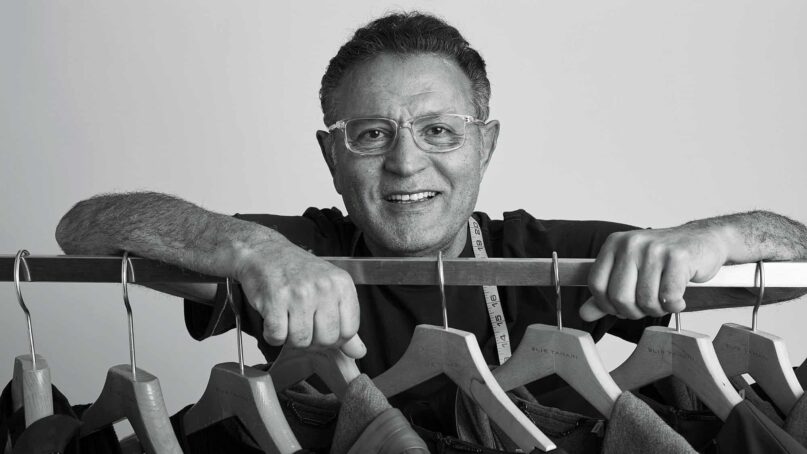
The 71-year-old Israeli fashion designer Elie Tahari is famous for his pantsuits, including those in which he personally dressed Hillary Clinton in the 1990s. With his development of the more accessible label, Theory, and lines for discount clothing stores like TJ Maxx, the pantsuit eventually became a fashion staple for a wide range of working women. But it went temporarily obsolete during the two-plus years of the coronavirus pandemic, which left many women opting for sweatsuits.
“Fashion changed completely,” Tahari told JNS from his N.J. home, alternating between Hebrew and English. “It became more casual, price-conscious.”
Tahari didn’t change his style to suit the post-pandemic trend, but he left the model that had produced his astounding success: storefronts and department stores.
“I made the collection online only,” he said.
Not only was the move profitable, he told JNS, but the lockdowns presented him with the opportunity to share his personal story, almost literally rags to riches. The documentary “The United States of Elie Tahari” came out in 2021 and, as of last month, is available on Amazon.
Aria for a fashion artist
Two months before the pandemic, Tahari had met David Serero, an opera singer of Moroccan and Persian descent, at the Sephardic Film Festival that Serero produces.
Serero, too, found his business—live performances—upended by COVID-19, he told JNS from his home in Paris.
“It was more about what was available to watch,” he told JNS. “I said, ‘I have to go into movies.’”
In Tahari’s life story, Serero was fascinated by the way that a homeless, Persian-Israeli émigré to New York City had risen to become a fashion maestro.
The interviews that Serero conducted in Manhattan with Tahari form the centerpiece of what is essentially a tribute film, which also features movers and shakers of the fashion world. Those include Melissa Rivers (an actress and daughter of Joan, who also appears in the film); the designers Nicole Miller and Dennis Basso; and Fern Mallis, the Sephardi Jew who founded New York Fashion Week. Journalist and television host Katie Couric is also featured.
The documentary, which Serero directed and produced, hit film festivals last year. It was screened publicly earlier this month, on July 2, coinciding with Paris Haute Couture Fashion Week. (With the unrest in Paris, turnout was lower than expected, and Tahari appeared by live video feed.)
From park bench to Park Avenue
Tahari was born in Jerusalem in 1952 to Iranian-born parents who found life too difficult in the ma’abarot—the tent cities set up around the periphery of the burgeoning country mainly for immigrant Jews from Middle Eastern countries.
He was just a year old when he, his parents and his six siblings moved back to Iran. Four years later, they returned to Israel, eventually settling in Sderot. His mother suffered from epilepsy, so Tahari was raised in an Israeli orphanage. Tailoring was one of the few professions open to Jews in Iran. Tahari’s father had worked as a fabric merchant, and his mother as a seamstress.
When Tahari moved to New York in 1971, he brought an inherited love for fabric and just $60. (That’s about $450 today accounting for inflation, according to the U.S. Department of Labor.) In the film, he described someone telling him: “New York is a Jewish city. I’m sure that there are many agencies that could help you.” Ultimately, he got ahead with that typical Israeli chutzpah.
The man, who slept on Central Park benches for several months when he could no longer afford a YMCA bed became a literal millionaire by transforming a simple piece of fabric—the “rag” that turned him into a rich man.
Working at an Israeli-owned clothing boutique in Manhattan and speaking with female customers about what they liked and needed, he invented the tube top—a fabric stylishly draped around a woman’s torso. He snuck into a trunk show and received his first order for 250,000 pieces at $2 each.
The documentary portrays Tahari as a generally clean-cut, down-to-earth and humble designer in an industry known for excess and hyper-glamour. Models often tower over Tahari at fashion shows in the film, but Serero attributes the designer’s success to listening to average women and what they were looking for.
The film portrays none of the industry’s dark side—cutthroat competition, drug abuse, even murder—the kind dramatized in recent films about Gucci, Halston and Versace. “At the end of the day, he never had a scandal,” Serero said.
He opted not to portray Tahari’s dispute with a former business partner in the film. And, Tahari admitted, there was partying along the way. After all, his first fashion show occurred at the infamous Studio 54. “There were periods when I was confused, and when I got swept away into the ego and the drugs,” Tahari told JNS. “But I came back to myself.”
‘Stand on my own two feet’
The Kabbalah Centre New York is no Studio 54 in the 1970s, but the center, whose most famous congregant was Madonna, has been no stranger to controversy. Tahari had a positive experience, which helped ground him.
“I was, for many years, a student of the Kabbalah Center,” he told JNS. “It taught me to stand on my own two feet, to value people and to treat people with respect.”
Tahari wasn’t religiously observant growing up, though he attended a religious high school for two years at Kfar Chabad in Israel.
“I think religion is wonderful, but I’m not connected to it,” he said.
The former Israeli Air Force mechanic remains an avowed Zionist. “Israel is the center of my life,” Tahari told JNS.
Serero compares Tahari’s success to that of Ralph Lauren (also Jewish) and Giorgio Armani, who are among the few to remain at the helm of their fashion empires after more than 45 years.
At least for now, the Elie Tahari brand (which has a multibillion-dollar value, per Serero) is not poised to become a family business. His college-aged son and daughter are interested in real estate and psychology, respectively.
Whether for designers, real estate agents or psychologists, Tahari believes in the American dream, he told JNS.
“It’s more difficult now,” he said. “But there is still more opportunity in the United States than any country in the world.”








 Southern New England Jewish Ledger
Southern New England Jewish Ledger










